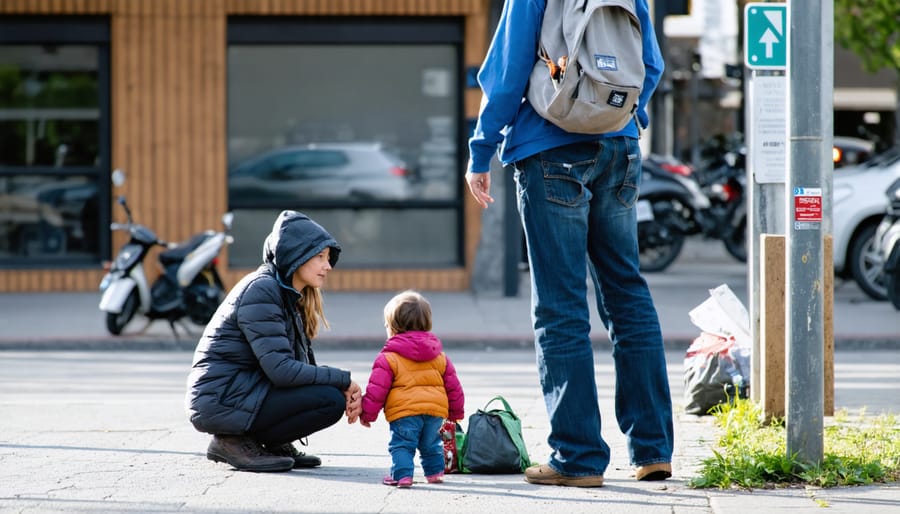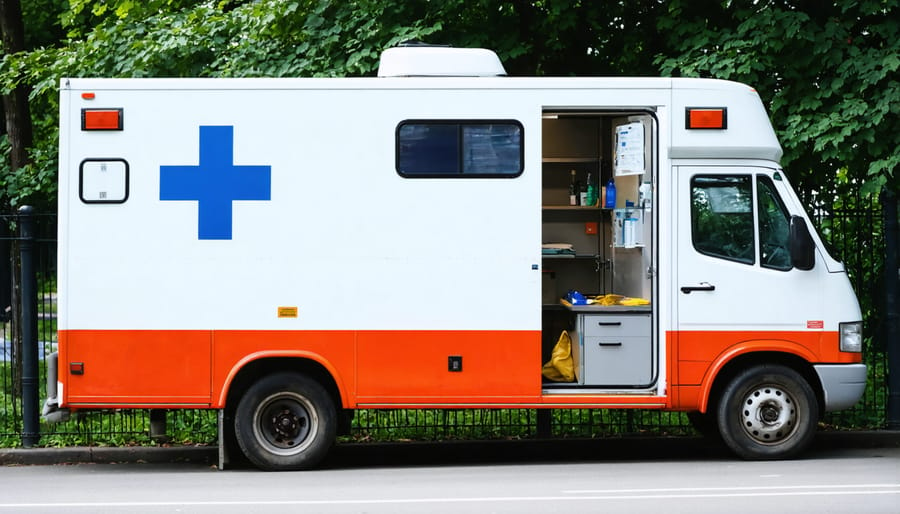Every day across America, dedicated outreach teams bridge critical gaps between homeless individuals and life-changing services through compassionate, street-level engagement. These vital connections transform lives by linking vulnerable community members with emergency shelter, medical care, mental health support, and permanent housing solutions.
Community-based homeless outreach represents more than just service delivery – it embodies our shared responsibility to ensure every person has access to basic human needs and opportunities to rebuild their lives with dignity. Through coordinated efforts between social service agencies, healthcare providers, and trained outreach specialists, we create pathways from crisis to stability for thousands of individuals and families experiencing homelessness.
The impact of strategic outreach extends far beyond immediate assistance. By building trusting relationships with people where they are – whether in encampments, vehicles, or on the streets – outreach workers help break down barriers to accessing comprehensive support systems. This person-centered approach recognizes that each individual’s journey through homelessness is unique and requires customized solutions delivered with understanding and respect.
This article explores proven strategies for effective homeless outreach, highlighting how integrated community support services create lasting positive change. We’ll examine evidence-based practices that help vulnerable populations access housing, healthcare, employment assistance and other essential resources needed to achieve long-term stability and wellbeing.

Building Trust Through Street Outreach
Mobile Mental Health Support
Mobile mental health support teams play a crucial role in reaching homeless families and children where they are, bringing essential psychological care directly to those in need. These specialized teams, consisting of licensed therapists, social workers, and peer support specialists, travel throughout the community to provide immediate mental health assistance and establish trust-based relationships.
Understanding that accessing traditional mental health services can be challenging for homeless families, these mobile units focus on mental well-being with community support through trauma-informed care approaches. They offer crisis intervention, counseling sessions, medication management support, and connections to long-term treatment options.
The teams are specifically trained to work with children experiencing homelessness, using age-appropriate therapeutic techniques and creative approaches like art therapy and play-based interventions. They also provide parent support services, helping caregivers manage their own stress while better supporting their children’s emotional needs.
Regular check-ins and flexible scheduling ensure continuity of care, even as families move between temporary housing situations. This persistent, compassionate presence helps build the foundation for lasting mental health recovery and stability.
Child-Focused Engagement Strategies
When engaging with homeless children, outreach workers use specialized approaches that prioritize trust-building and emotional safety. Creating a welcoming, non-threatening environment often begins with play-based interactions, using age-appropriate games and activities that help children feel comfortable and understood.
Outreach teams typically include trained child specialists who understand developmental needs and trauma-informed care principles. These specialists use art therapy, storytelling, and interactive games to help children express their feelings and experiences in a safe way.
Meeting children where they are – both physically and emotionally – is crucial. This might mean conducting activities in familiar spaces like parks or community centers, or simply sitting quietly with a child who needs time to feel secure. Outreach workers also incorporate educational elements into their engagement strategies, offering homework help or informal learning activities that maintain academic connections.
Family-centered approaches are essential, involving parents or caregivers whenever possible to strengthen family bonds and ensure sustainable support. Workers help create routines and stability through regular check-ins and consistent meeting times, which can provide much-needed structure in otherwise uncertain circumstances.
Essential Services for Homeless Families
Emergency Housing Solutions
When families face housing emergencies, immediate shelter solutions can provide crucial stability during challenging times. Emergency shelters offer safe, temporary accommodations where families can stay together while working with case managers to develop longer-term housing plans. These facilities typically provide basic necessities, including beds, meals, and access to bathroom facilities.
Many communities maintain family-specific shelters that create child-friendly environments with play areas, homework spaces, and support services tailored to young people’s needs. Some facilities offer private family rooms, allowing parents and children to maintain routines and privacy during their stay.
For situations requiring immediate assistance, many cities operate 24-hour emergency housing hotlines. These services can quickly connect families with available shelter beds or hotel vouchers when traditional shelters are at capacity. Additionally, rapid rehousing programs help families transition from emergency shelter to stable housing by providing short-term rental assistance and support services.
Faith-based organizations and community centers often serve as entry points for emergency housing, offering temporary solutions while connecting families with more permanent resources. These partnerships ensure that families receive comprehensive support during housing crises.

Healthcare and Mental Health Support
Healthcare and mental health support for homeless individuals often begins with mobile medical units that bring essential care directly to where it’s needed most. These teams include doctors, nurses, and mental health professionals who provide basic health screenings, vaccinations, and immediate medical attention. What makes these services particularly effective is their integration with mental health networks for children and families, ensuring comprehensive care for all ages.
Outreach workers help connect individuals to local clinics, mental health counselors, and substance abuse treatment programs when needed. They understand that physical and mental health challenges often intertwine, especially for those experiencing homelessness. Services typically include:
– Emergency medical care
– Prescription assistance programs
– Regular health check-ups
– Mental health counseling
– Substance abuse treatment
– Trauma-informed care
– Crisis intervention services
These programs work collaboratively with local hospitals and community health centers to create seamless care transitions, ensuring that homeless individuals receive continuous support even after their immediate needs are met. The focus remains on building trust and maintaining long-term relationships to support sustained health improvements.
Educational Support for Children
Educational support programs play a vital role in maintaining stability for children experiencing homelessness. These initiatives work closely with local schools to ensure children have the resources they need for educational success, including school supplies, tutoring, and transportation assistance. Many programs offer after-school homework help centers where students can study in a quiet environment and receive one-on-one support from qualified teachers. Additionally, these services help families navigate school enrollment processes, obtain necessary documentation, and access special education services when needed. Mobile learning centers and digital device lending programs ensure children can participate in remote learning opportunities, while partnerships with local libraries provide additional educational resources and safe spaces for studying.
Coordinated Care Approach
Case Management Services
Case managers serve as vital bridges between homeless individuals and the support services they desperately need. Working one-on-one with clients, these dedicated professionals create personalized care plans that address immediate needs while building pathways toward stable housing and improved well-being.
Through regular meetings and consistent follow-up, case managers help clients navigate complex systems of healthcare, housing, education, and social services. They assist with crucial documentation, appointment scheduling, and transportation arrangements, removing barriers that often prevent access to essential resources.
For families with children, case managers take special care to ensure young ones receive proper medical care, maintain school attendance, and access mental health support when needed. They coordinate with school counselors, pediatricians, and child development specialists to create comprehensive support networks.
Most importantly, case managers build trusting relationships with their clients, offering emotional support and encouragement throughout their journey. They celebrate small victories, provide gentle accountability, and help maintain momentum toward established goals. This consistent, caring presence often makes the difference between temporary assistance and lasting positive change.
By maintaining detailed records and coordinating with various service providers, case managers ensure that care remains continuous and well-organized, preventing clients from falling through institutional cracks.

Partner Organization Network
Community support services for homeless outreach thrive through interconnected partnerships between various organizations working together to create a comprehensive safety net. Local shelters collaborate closely with mental health providers, food banks, educational institutions, and healthcare facilities to address the multiple challenges faced by homeless families and children.
These partnerships enable a more efficient allocation of resources and prevent service duplication. For example, when a family visits a food bank, they can be seamlessly connected to housing assistance programs, medical care, and educational support for their children. Social workers often serve as care coordinators, helping families navigate this network of services effectively.
Faith-based organizations, government agencies, and nonprofit groups regularly share information, resources, and best practices through coordinated outreach efforts. Many communities have established regular partner meetings and shared database systems to track available services and identify gaps in support. This collaborative approach ensures that families receive holistic care addressing both immediate needs and long-term stability goals.
The strength of these partnerships becomes particularly evident during crisis situations, when organizations can quickly mobilize resources and coordinate emergency responses to support vulnerable community members.
The transformative power of community support services is evident in countless success stories across our communities. Take Sarah and her two children, who found themselves homeless after fleeing domestic violence. Through dedicated outreach workers and coordinated support services, they not only secured stable housing but also received counseling, educational support, and healthcare assistance. Today, Sarah works as a peer support specialist, helping other families navigate similar challenges.
Stories like these highlight how comprehensive community support can break the cycle of homelessness. When communities come together – from local businesses offering job training to schools providing additional academic support – the impact is profound and lasting. In Minneapolis, a collaborative program between outreach services and local shelters has helped over 200 families transition to permanent housing in the past year alone, with 85% maintaining stable housing after two years.
The success of these programs relies heavily on community involvement and understanding. Every volunteer, donor, and advocate plays a crucial role in helping homeless families rebuild their lives. Whether it’s providing meals, mentoring children, or offering professional services, these contributions create a strong support network that catches families before they fall through the cracks.
As we’ve seen time and again, when communities invest in homeless outreach services, everyone benefits. Children return to school with renewed confidence, parents regain their independence, and families heal together. These outcomes remind us that homelessness is not an insurmountable challenge when we work together with compassion and dedication.







